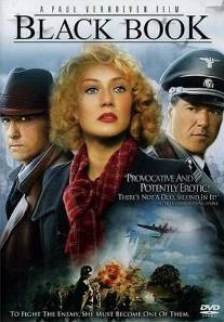Zhivagoesque epic for Nazi-occupied Europe 8/10
 Black Book (from the Dutch Zwartboek) is a wonderfully casted and executed World War II movie about the Nazi oppression of conquered peoples that doesn’t stereotype anyone. It also doesn’t pull any punches about the brutality of the Nazis toward the Jews, the brutality of the Nazis toward any of the locals—in this case the Dutch—who dared to object to this once-in-a-lifetime opportunity to worship the Fuhrer, and the treachery within the ranks of the Reich’s victim classes.
Black Book (from the Dutch Zwartboek) is a wonderfully casted and executed World War II movie about the Nazi oppression of conquered peoples that doesn’t stereotype anyone. It also doesn’t pull any punches about the brutality of the Nazis toward the Jews, the brutality of the Nazis toward any of the locals—in this case the Dutch—who dared to object to this once-in-a-lifetime opportunity to worship the Fuhrer, and the treachery within the ranks of the Reich’s victim classes.
Apparently, this latter quality—that many individuals secretly collaborated with the Nazis, even when they weren’t under special duress—is somewhat controversial among some Jewish (and Dutch) viewers, but it shouldn’t be: anyone who’s been in a concentration camp, just as people who’ve been in military combat, will tell you there’s no way to predict how a man or woman will stand up under persistent threats of force. Simply watch Saving Private Ryan… or Bridge on the River Kwai. The same guy who cowers in a foxhole one day, the next day takes on a whole brigade singlehandedly. Certainly no ethnic group is immune from individuals caving, too easily, under pressure, and doing nasty things to their own.
But aside from some PC reservations, this movie doesn’t make a false step; it deserves a ranking among the best noncombat World War II movies I’ve seen—many of which were made in a different era, closer to the war. What distinguishes Black Book, for movies war and nonwar, is the lead role: like Ellen Ripley (Sigourney Weaver) in Alien, Rachel Stein (Carice van Houten) is a true-to-life heroine. The story is her story, conveyed in a retrospective as Rachel takes a timeout from teacher duties at an Israeli kibbutz in 1956; the sentimental journey is triggered by a tourist who turns out to be a coworker Ronnie (Halina Reijn) of Rachel’s in Holland during the Occupation. Continue reading
